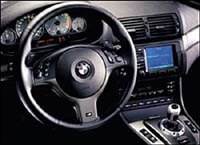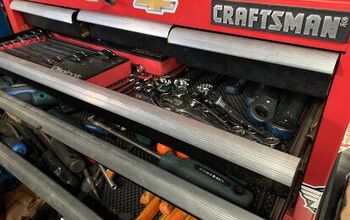Tripedalists of the World Unite!
Here in the world's biggest automotive market, the automatic gearbox rules, with the vast majority of American electing to have their cars do the shifting for them. This, despite the fact that automatics are inherently less efficient than stick shift systems (an autobox's torque converter squanders resources unless in full lockup). What's more, the average slushbox falls apart sooner than a manual transmission, while often being a high-cost option in the first place. But even if you stray beyond the empirical realm, the truth of the matter is obvious: manual transmissions are the more pleasurable, safer choice.
Enthusiast drivers derive much of their satisfaction by changing gears of their own accord. Even the best adaptive automatics consistently fail to respond to the sporting driver's commands with suitably efficiency. (Hence the motivations behind most racers opting for manual gearchanges, even when the sanctioning bodies under which they compete fail to mandate them.) Technological advances like "fly-by-wire" throttles and GPS-based logic may eventually eliminate the autobox' temporal shortcomings, but until then, accomplished cog swappers know the tripedal dance remains most efficient and satisfying method for conducting business.
Okay – I'll throw you automatic-types a bone here… Volkswagen's DSG 'box is admittedly fantastic – a seriously entertaining gewgaw so overwhelmingly competent it gives even dyed-in-the-wool manual guys like me reason for pause. While we're at it, I've little doubt that the 7-speed automanual in BMW's gonzo new M5 strokes like liquid sex, but neither of these two systems are traditional slushboxes. Yes, semi-automatics have been alternatives for decades, but truly effective, reliable, and inexpensive units are only just coming on stream.
Arguments about the relative safety of the two systems– another suitably emotive topic on which to base this discussion — are almost as fuzzy as the logic controlling many of today's automatics. Even so, I believe that the average manual driver is an inherently safer pilot than his/her autopilot counterpart. Operating a manual forces the driver to concentrate on the task of driving. To select the appropriate gear, DIY shifters must reconcile the road's geography and coefficient of adhesion, engine and vehicle speed, and traffic conditions. The automatic driver? Dip into 'D' and carpet the pedal. Might as well have a bag of Callaways rattling 'round back and a gimlet in hand headed for the back nine.
As such, automatics may be the stop-and-go commuter's friend, but they encourage drivers to engage in activities utterly unrelated to vehiculation. Automatic operators more readily disconnect from the inherently dangerous process that is driving, freeing up the spare neurons needed to check one's voicemail, shuffle through an MP3 collection and/or quaff a tall double soy latte.
Oh, and if 'automatics are safer than manuals because they're easier to operate', what about the steering wheel? By this yardstick, the steering wheel is another monumentally inefficient and treacherous method of car control, mandating the coordinated use of two arms flailing about and crossing hand-over-hand (directly over a latent explosive bag, no less). Surely my ten-year-old's Playstation controller has the whole system beat stone dead, the drive-by-wire articulation of his entire universe being but a thumb-press away.
While we're at it, braking via a hinged floor plate is an equally antediluvian activity when a two-centimeter round plastic button would suffice. No feedback, you say? Artificial dynamic reinforcement could be dialed-in with a servomechanism and a few choice keystrokes, but why not let the hordes of available electronic nannies (ABS, EBD, etc.) handle such distractions instead?
Take the argument against manuals to its logical conclusion and you end up with a stunning rationale for mass transit. If we all cruise in lockstep down Technology Road, the promise of satellite-governed transportation pods lie just beyond the next bend… a move that'll rid us of the nasty and tedious business that is driving altogether. That's alright for some, maybe even most, but not all. Some still find perverse pleasure in mastering heel-toe. Some take adolescent joy in an engine strained if only to hear it on song. Some would rather turn a wheel in anger than commute in silence. Others, however, are simply seeking the most efficient manner in which to decant themselves from port to port. Bravo, straphangers — here's your column shifter.
Mind you, I'm a realist. The day will come when manual transmissions will be the exclusive preserve of secondhand poverty-spec econobox owners and doddering vintage car aficionados. Whether that's because an ever-increasing number of consumers can't be bothered to shift for themselves (making it impossible for automakers to cost-effectively produce manuals), because stringent environmental laws outlaw them, or because GPS-regulated vehicles proscribe such individualistic behavior, I've little doubt that the manual will eventually go the way of tiller steering. At which time you'll find me hunched over a dog-eared Hemmings, checkbook in hand, fevered glint in my eye.
More by Chris Paukert
Latest Car Reviews
Read moreLatest Product Reviews
Read moreRecent Comments
- SCE to AUX The nose went from terrible to weird.
- Chris P Bacon I'm not a fan of either, but if I had to choose, it would be the RAV. It's built for the long run with a NA engine and an 8 speed transmission. The Honda with a turbo and CVT might still last as long, but maintenance is going to cost more to get to 200000 miles for sure. The Honda is built for the first owner to lease and give back in 36 months. The Toyota is built to own and pass down.
- Dwford Ford's management change their plans like they change their underwear. Where were all the prototypes of the larger EVs that were supposed to come out next year? Or for the next gen EV truck? Nowhere to be seen. Now those vaporware models are on the back burner to pursue cheaper models. Yeah, ok.
- Wjtinfwb My comment about "missing the mark" was directed at, of the mentioned cars, none created huge demand or excitement once they were introduced. All three had some cool aspects; Thunderbird was pretty good exterior, let down by the Lincoln LS dash and the fairly weak 3.9L V8 at launch. The Prowler was super cool and unique, only the little nerf bumpers spoiled the exterior and of course the V6 was a huge letdown. SSR had the beans, but in my opinion was spoiled by the tonneau cover over the bed. Remove the cover, finish the bed with some teak or walnut and I think it could have been more appealing. All three were targeting a very small market (expensive 2-seaters without a prestige badge) which probably contributed. The PT Cruiser succeeded in this space by being both more practical and cheap. Of the three, I'd still like to have a Thunderbird in my garage in a classic color like the silver/green metallic offered in the later years.
- D Screw Tesla. There are millions of affordable EVs already in use and widely available. Commonly seen in Peachtree City, GA, and The Villages, FL, they are cheap, convenient, and fun. We just need more municipalities to accept them. If they'll allow AVs on the road, why not golf cars?





































Comments
Join the conversation